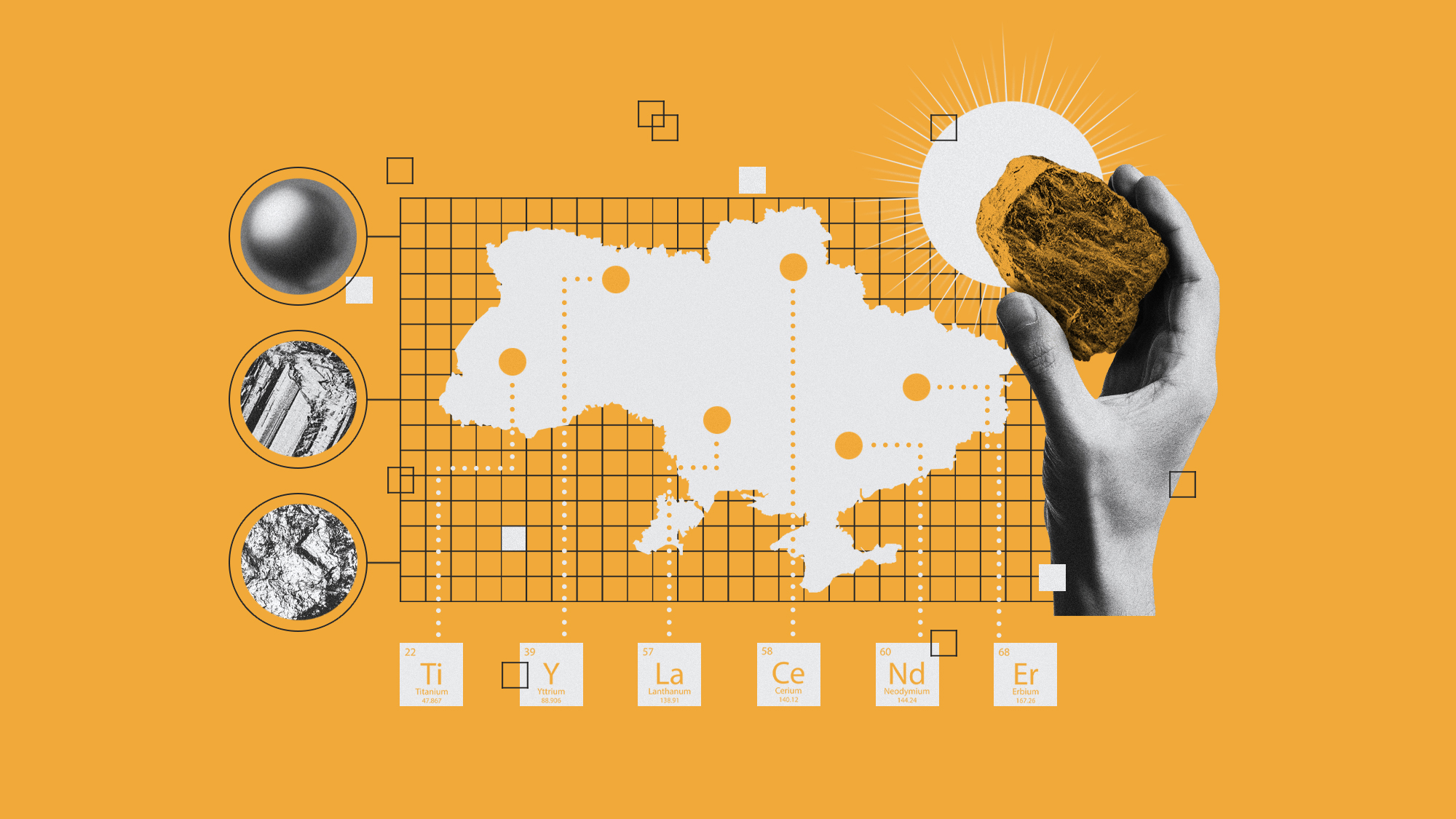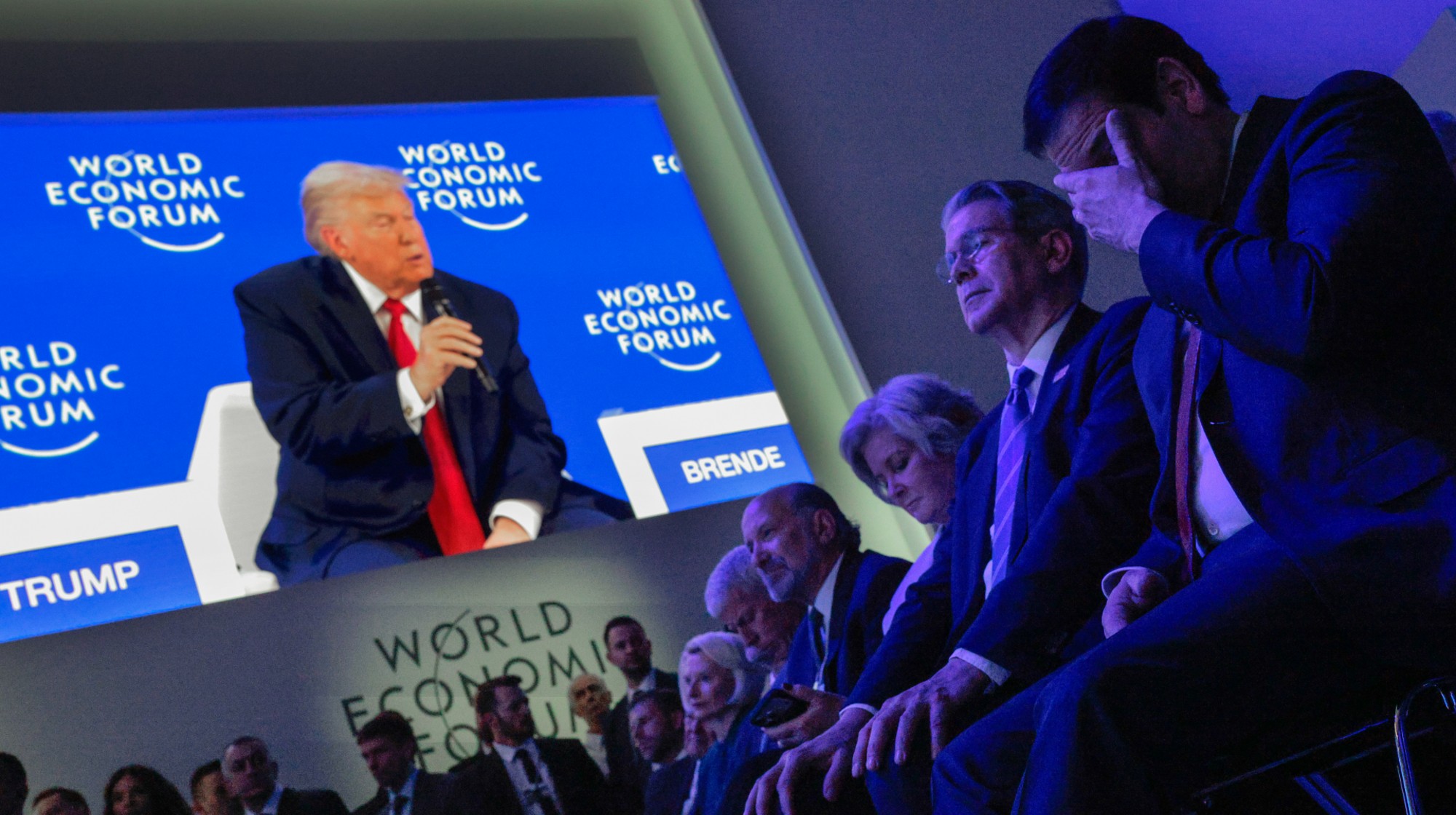Ukraine's mineral riches and Trump's shakedown diplomacy
President's demand for half of Kyiv's resources in return for past military aid amounts to 'mafia blackmail tactics' and 'colonialism'

A free daily email with the biggest news stories of the day – and the best features from TheWeek.com
You are now subscribed
Your newsletter sign-up was successful
As world powers scramble for control of crucial rare-earth minerals, the US has a controversial proposal: reparations from Ukraine.
President Donald Trump has demanded ownership of 50% of Ukraine's mineral resources, arguing that the US is owed $500 billion in return for Washington's military support – which so far amounts to just under $70 billion since 2014. "They may make a deal, they may not make a deal," Trump told Fox News. "We are going to have all this money in there, and I say I want it back."
Volodymyr Zelenskyy was told he had "an hour" to agree to the memorandum, sources told The Economist. The Ukrainian president declined before his team agreed to negotiate. But Trump's approach has "enraged" European allies, said the Financial Times. Officials at the Munich Security Conference compared it to "mafia blackmail tactics" and "colonialism".
The Week
Escape your echo chamber. Get the facts behind the news, plus analysis from multiple perspectives.

Sign up for The Week's Free Newsletters
From our morning news briefing to a weekly Good News Newsletter, get the best of The Week delivered directly to your inbox.
From our morning news briefing to a weekly Good News Newsletter, get the best of The Week delivered directly to your inbox.
What are Ukraine's critical minerals?
Ukraine is thought to have vast reserves of minerals, worth up to $11.5 trillion, said the FT. According to Kyiv, the country has deposits of 22 of the 34 minerals identified as critical by the EU, including rare-earth minerals. It claims about 10% of the world's lithium, critical for electronic vehicle battery production – probably the biggest reserve in Europe – but none has been mined so far.
Ukraine also has the largest titanium reserves in Europe, according to Mining.com. Titanium is used in the production of aircraft and ships and Ukraine is capable of meeting US and EU demand for more than 25 years.
What is Trump's proposal?
The idea of giving the US a stake in Ukraine's mineral wealth originated in Zelenskyy's "victory plan", which he presented to Joe Biden and Trump in October. The plan promised to open up Ukraine's rare-earth elements to US companies, in return for America helping Ukraine build "non-nuclear strategic deterrence". Trump "appears to have read only its first half", said The Economist.
This proposal "goes far beyond US control" over Ukraine's critical minerals, according to a draft of the contract seen by The Telegraph. It covers "everything from ports and infrastructure to oil and gas", and amounts to "economic colonisation of Ukraine, in legal perpetuity". It equals "a higher share of Ukrainian GDP than reparations imposed on Germany" after the Second World War.
A free daily email with the biggest news stories of the day – and the best features from TheWeek.com
Why does Trump want them?
One big reason, said The Guardian: China. Most of the world's capacity to process and refine those minerals is in China. It also accounts for almost half the world's rare-earth elements, according to US Geological Survey data, and its share of refining them is nearly 90% – an "overwhelming" dominance.
With Trump "effectively instigating a trade war with China", US access to critical minerals is "potentially under threat". Minerals are "the building blocks of the economy of the future, and if the US doesn't get its hands on them, someone else will".
What are the problems with it?
Ukraine's mineral deposits have "not undergone any significant exploration or development", said the FT. To benefit from them would take decades, and face major bureaucratic hurdles.
More than 20% of Ukraine's minerals are now in areas under Russian control, Kyiv admits. It could be as much as 40%, said The Guardian. Russia "may have offered a backchannel proposal to the Trump team for access to those resources", said The Economist.
Others argue that estimates of the country's mineral wealth are based on outdated Soviet-era studies. The sums are "make-believe", said The Telegraph. Ukraine "cannot possibly" meet Trump's $500 billion demand. The proposal is "iron-fist coercion by a neo-imperial power against a weaker nation with its back to the wall, and all for a commodity bonanza that exists chiefly in Trump's head".
What does Ukraine say?
Zelenskyy said the proposal contained none of the post-conflict security guarantees that Ukraine needs. "We can think about how to divide resources once security guarantees are clear," he said in Munich.
This is crucial because Ukrainians believe the US and UK already "failed to live up to their obligations" to protect it, under an agreement signed at the end of the Cold War when Ukraine gave up its nuclear weapons, said The New York Times. The deal could "hand Russia a propaganda win by casting the war as a battle for resources" rather than protecting democracy, according to a former diplomat.
The draft may also violate Ukrainian law. According to Ukraine's constitution, its mineral resources belong to its people.
Harriet Marsden is a senior staff writer and podcast panellist for The Week, covering world news and writing the weekly Global Digest newsletter. Before joining the site in 2023, she was a freelance journalist for seven years, working for The Guardian, The Times and The Independent among others, and regularly appearing on radio shows. In 2021, she was awarded the “journalist-at-large” fellowship by the Local Trust charity, and spent a year travelling independently to some of England’s most deprived areas to write about community activism. She has a master’s in international journalism from City University, and has also worked in Bolivia, Colombia and Spain.
-
 Political cartoons for February 15
Political cartoons for February 15Cartoons Sunday's political cartoons include political ventriloquism, Europe in the middle, and more
-
 The broken water companies failing England and Wales
The broken water companies failing England and WalesExplainer With rising bills, deteriorating river health and a lack of investment, regulators face an uphill battle to stabilise the industry
-
 A thrilling foodie city in northern Japan
A thrilling foodie city in northern JapanThe Week Recommends The food scene here is ‘unspoilt’ and ‘fun’
-
 Greenland’s capital becomes ground zero for the country’s diplomatic straits
Greenland’s capital becomes ground zero for the country’s diplomatic straitsIN THE SPOTLIGHT A flurry of new consular activity in Nuuk shows how important Greenland has become to Europeans’ anxiety about American imperialism
-
 Which way will Trump go on Iran?
Which way will Trump go on Iran?Today’s Big Question Diplomatic talks set to be held in Turkey on Friday, but failure to reach an agreement could have ‘terrible’ global ramifications
-
 Ukraine, US and Russia: do rare trilateral talks mean peace is possible?
Ukraine, US and Russia: do rare trilateral talks mean peace is possible?Rush to meet signals potential agreement but scepticism of Russian motives remain
-
 Trump backs off Greenland threats, declares ‘deal’
Trump backs off Greenland threats, declares ‘deal’Speed Read Trump and NATO have ‘formed the framework for a future deal,’ the president claimed
-
 The rise of the spymaster: a ‘tectonic shift’ in Ukraine’s politics
The rise of the spymaster: a ‘tectonic shift’ in Ukraine’s politicsIn the Spotlight President Zelenskyy’s new chief of staff, former head of military intelligence Kyrylo Budanov, is widely viewed as a potential successor
-
 Iran in flames: will the regime be toppled?
Iran in flames: will the regime be toppled?In Depth The moral case for removing the ayatollahs is clear, but what a post-regime Iran would look like is anything but
-
 Europe moves troops to Greenland as Trump fixates
Europe moves troops to Greenland as Trump fixatesSpeed Read Foreign ministers of Greenland and Denmark met at the White House yesterday
-
 Why Greenland’s natural resources are nearly impossible to mine
Why Greenland’s natural resources are nearly impossible to mineThe Explainer The country’s natural landscape makes the task extremely difficult